Runaway Jury Blu-ray Movie
HomeRunaway Jury Blu-ray Movie 
20th Century Fox | 2003 | 128 min | Rated PG-13 | Feb 28, 2012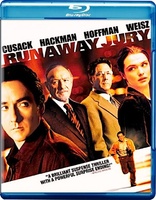
Movie rating
6.9 | / 10 |
Blu-ray rating
| Users | 4.0 | |
| Reviewer | 4.0 | |
| Overall | 4.0 |
Overview
Runaway Jury (2003)
With lives and millions of dollars at stake, a ruthless jury consultant plays a deadly cat-and-mouse game with a jury member and a mysterious woman who offer to "deliver" the verdict to the highest bidder.
Starring: John Cusack, Gene Hackman, Dustin Hoffman, Rachel Weisz, Bruce DavisonDirector: Gary Fleder
| Thriller | Uncertain |
| Crime | Uncertain |
| Drama | Uncertain |
Specifications
Video
Video codec: MPEG-4 AVC
Video resolution: 1080p
Aspect ratio: 2.35:1
Original aspect ratio: 2.39:1
Audio
English: DTS-HD Master Audio 5.1 (48kHz, 16-bit)
Spanish: Dolby Digital 5.1 (448 kbps)
French: Dolby Digital 5.1 (448 kbps)
German: DTS 5.1
Italian: DTS 5.1
Russian: DTS 5.1
Spanish: DTS 5.1 (48kHz, 16-bit)
Spanish DTS 5.1=Castillian
Subtitles
English SDH, French, German, Italian, Portuguese, Spanish, Arabic, Croatian, Danish, Dutch, Finnish, Norwegian, Polish, Romanian, Russian, Slovenian, Swedish
Discs
50GB Blu-ray Disc
Single disc (1 BD)
Playback
Region free
Review
Rating summary
| Movie | 4.0 | |
| Video | 4.0 | |
| Audio | 4.5 | |
| Extras | 4.0 | |
| Overall | 4.0 |
Runaway Jury Blu-ray Movie Review
It's Not About the Law
Reviewed by Michael Reuben May 14, 2012If jury duty were as interesting as it's portrayed in Runaway Jury, people wouldn't be so eager to avoid it. Unfortunately, most cases don't have the dramatic heft of the anti-gun manufacturer suit portrayed in the film (changed from the John Grisham novel's anti-tobacco suit after The Insider pre-empted the subject). Most judges don't run as efficient a courtroom as Bruce McGill's Judge Harkin, and most trial lawyers aren't nearly as entertaining (or well prepared) as the attorneys portrayed by Dustin Hoffman and Bruce Davison. And if there really is a sleek shark of a jury consultant like Gene Hackman's Rankin Fitch, complete with an army of hi-tech experts, then he'd be so expensive that even the biggest corporations wouldn't pay for him unless their very existence was at stake. In reality, the typical jury consultant is more likely to resemble the low-rent grunt played by Jeremy Piven, who all but volunteers his services to the plaintiff, because he's trying to build a reputation. And most cases aren't worth enough to afford even him. But no one ever made an entertaining thriller by sticking to reality. Besides, director Gary Fleder has said repeatedly (and I agree) that Runaway Jury isn't a courtroom drama; it's a film about a con. The courtroom is just the locale where the grifters work their swindle. When I first started in law practice, I was shocked at the number of senior trial lawyers who told me never to go to court expecting truth or justice. Eventually I came to understand their cynicism as a realistic appraisal of the limits of any human institution, which always falls short of its ideals. Runaway Jury simply takes that notion to its logical conclusion by making a jury verdict the McGuffin of a plot in which everyone is after a particular result. Some pursue it by traditional means. Others take alternate paths of a more, shall we say, "creative" nature.
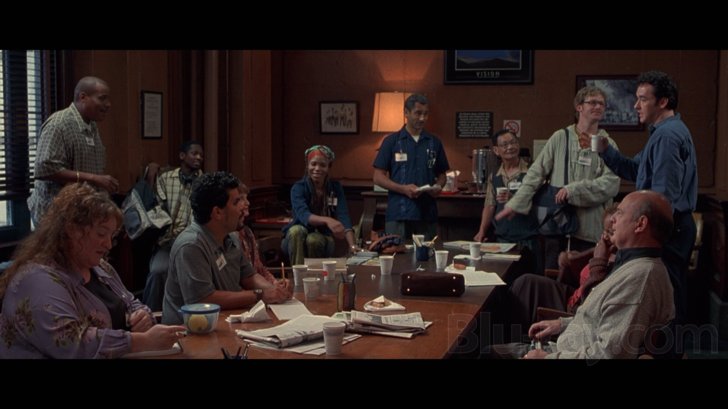
A brief opening sequence depicts an attack on a New Orleans brokerage office by a crazed former employee, who fatally guns down eleven people with an assault weapon, including Jacob Woods (Dylan McDermott). Two years later, Jacobs' widow, Celeste (Joanna Going), is about to go to trial in a suit against Vicksburg Firearms, the manufacturer of the gun used in the attack. Her attorney is an experienced trial lawyer, Wendell Rohr (Hoffman). Vicksburg's lead counsel is Durwood Cable (Davison), but the real firepower is one of the world's leading jury consultants, Rankin Fitch (Hackman), who has traveled the country working cases for gun manufacturers. Fitch earns top dollar, because he will do whatever it takes to ensure that the jury selected to hear the case against Vicksburg will be inclined to render a verdict in its favor. His methods range from the legal (demographic studies, handwriting analysis, psychology, observation of body language) to the borderline (surveillance, background checks) to the clearly illegal (hacking of credit card receipts, theft of confidential medical files, direct intimidation). Fitch isn't admitted to the bar, and he never stands up in court, but he's the one running Vicksburg's case—a fact that Wendell Rohr doesn't begin to appreciate until he's approached by a newcomer in the field, Lawrence Green (Piven), who wants to even the odds a little (and build his resumé) by working as Rohr's jury consultant. A wild card in the mix is Nick Easter (John Cusack), a clerk in a video game store who receives a summons for jury duty on the Woods case and, at least on the surface, has the usual reaction, which is "how can I get out of it?" But Nick has another agenda, and it starts to emerge after he's selected as Juror Number Nine. At about the same time, both Fitch and Rohr begin receiving messages and phone calls from a woman (Rachel Weisz) who identifies herself as "Marlee" and claims that she's in a position to "sell" one of them the Woods jury for $10 million. They don't believe her at first, but Marlee arranges impressive demonstrations of her ability to influence the jurors' behavior. One of them involves a surprise showing of patriotic sentiment; another involves having a juror sympathetic to the side who has defied her thrown off the panel. The reactions of Rohr and Fitch when, at different moments, each of them realizes that the jury is truly being controlled by an outside party are high points of the film. That Runaway Jury isn't a courtroom drama should be obvious, because, as the trial progresses, we keep cutting away from it to the ever more elaborate cat-and-mouse games being conducted in the surrounding environs of New Orleans. With Fitch's well-equipped crew, much of this looks like sophisticated espionage, but as Fitch feels matters slipping further from his control, he quickly descends into old-fashioned thuggery, including breaking and entering, blackmail, kidnapping, false imprisonment and arson. By the time the moment of decision arrives, and each side has to decide whether to pay up, no one really cares about the quality of the plaintiff's evidence. Runaway Jury benefits from a remarkable ensemble, especially among the jurors, most of whom have limited screen time but make the most of it to create a strong impression of lives beyond jury duty. You can't appreciate the impact of the various manipulations unless they're being directed at people who feel real. In addition to Jennifer Beales, former SNL regular Nora Dunn and Cliff Curtis (Live Free or Die Hard), the jury includes reliable character actors Bill Nunn, Rhoda Griffs (the registration lady in The Hunger Games), Luis Guzmán and Gerry Bamman as Herman Grimes, a blind man who insists on doing jury service and can quote precedent from memory in support of his right to do so. Bruce McGill, who was the sheriff in My Cousin Vinny and whose extensive credits go all the way back to Animal House, plays the no-nonsense Judge Harkin. But of course the casting that dominated Runaway Jury's marketing campaign was Hackman and Hoffman, life-long friends and former roommates and acting classmates who had never before appeared together in a film. An entirely new scene for Rohr and Fitch had to be written to give these two pros screen time together, and it's a great scene. Rohr is the angry idealist, Fitch the amoral opportunist, and they tear at each other with all they've got. The irony is that both of them are about to be rendered irrelevant.
Runaway Jury Blu-ray Movie, Video Quality 
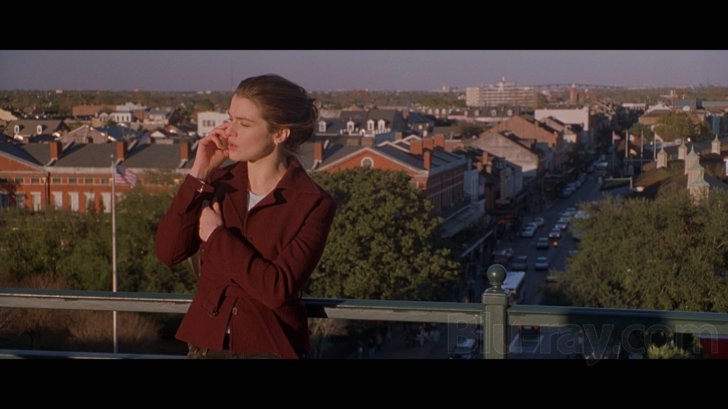
Oscar-winning cinematographer Robert Elswit (There Will Be Blood) shot Runaway Jury, and the 1080p, AVC-encoded Blu-ray from Fox nicely reproduces his trademark fluid camera movement and use of shadows to create depth. The film was made just before the era when digital intermediates became standard practice, so that it was finished photochemically. However, the elements used for this Blu-ray are in excellent condition, and the image harvest has been well performed, yielding a film-like image with a natural grain field and an impressive amount of detail, including in long shots of the crowded courtroom and the busy streets and sidewalks of New Orleans. The color palette is on the warm and "dusty" side, which is appropriate to the locale. The notable exception is in Fitch's "war room", where the glow of plasma TV monitors and computer screens casts a cool and bluish tone everywhere. Black levels are good enough that nighttime scenes, which often involve clandestine meetings, easily differentiate between various levels of darkness and provide sufficient shadow detail. I saw no indication of inappropriate digital tampering, such as high frequency filtering or sharpening, nor did I encounter any compression artifacts. (Note: User reviews complaining about a lack of "pop", contrast or sharpness have missed the mark. Runaway Jury was not shot in the hi-def video style that has since become common and also popular with Blu-ray fans. This transfer is both film-like and accurate.)
Runaway Jury Blu-ray Movie, Audio Quality 
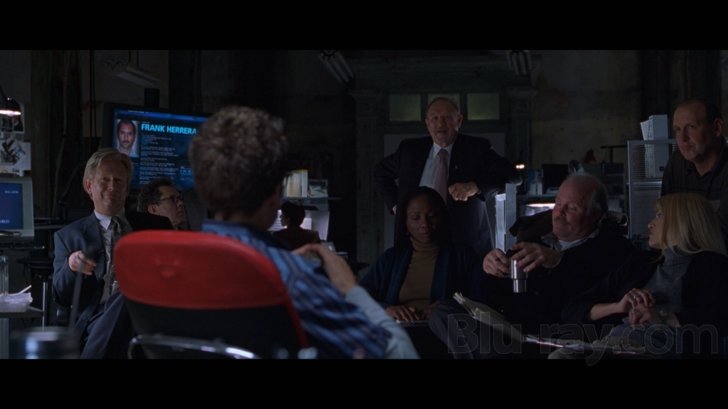
Fleder has said elsewhere that he believes in using sound subjectively in film, and Runaway Jury continues this approach, e.g., when Rankin Fitch rushes out from a restaurant into the street in pursuit of someone, and all the speakers fill with the sounds of the environment as Fitch would experience them. Another example occurs at the very beginning during the invasion of the brokerage office, when Jacob Woods realizes they are under attack; everything suddenly becomes much louder, then abruptly much quieter, as Jacob's life ends. Similar striking moments occur throughout the film, and they are reproduced with punch and presence by the DTS-HD MA 5.1 track. However, the sound mix is sufficiently subtle that it doesn't distract by calling too much attention to itself. It blends seamlessly with the action on screen, and one can watch the entire film without consciously realizing just how active and immersive the mix really is. Bass extension is deep and powerful, although the LFE is sparingly used. The dialogue is generally clear and centered, except for an occasional word that Dustin Hoffman swallows because of Rohr's southern accent or that Rachel Weisz mangles because she was still working on her American accent. The score by Christopher Young (Copycat) is reproduced with good fidelity and gets the job done.
Runaway Jury Blu-ray Movie, Special Features and Extras 
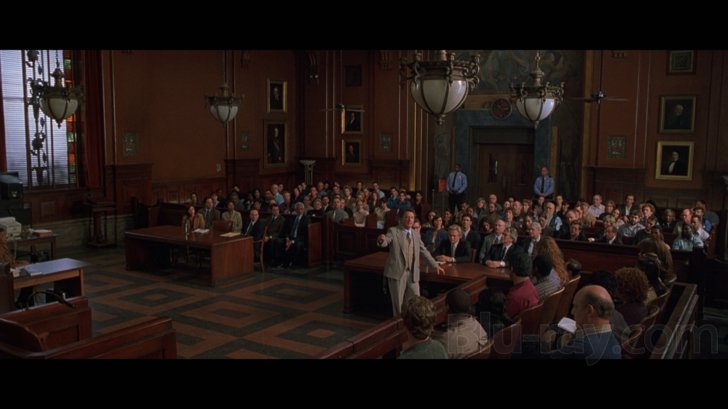
The extras have been ported over from the 2004 DVD.
- Commentary by Director Gary Fleder: Fleder is an engaging speaker, and he's especially good at invoking the sensation of working on the film before it was complete—that is, of standing on a set with actors figuring out why a scene or a piece of dialogue isn't working, or sitting in the editing room trying to find a way to make a sequence more tense and engaging (or trying to decided whether it should stay in the film at all), or observing the reaction of a preview audience and figuring out why they seem to be losing the narrative thread at this or that point. In one notable example, Fleder points out a quick insert of a composite photograph that includes younger versions of John Cusack and Rachel Weisz; this occurs in the elaborate cross-cutting near the end of the film during jury deliberations, and, according to Fleder, this one shot altered the dynamic of the entire sequence. Interspersed throughout the commentary are valuable insights on an array of subjects, including casting, acting styles and the changes between novel and screenplay. Optional subtitles are available in English, French, German, Italian, Dutch and Spanish.
- Deleted Scenes (SD; 2.35:1, non-enhanced; 1:54): There are two scenes with optional commentary by Fleder. The first is a brief additional scene of a phone call between Nick and Marley following Nick's conversation with another juror. The second is a brief conversation between Nick and Luis Guzmán's juror, Jerry Hernandez, speculating about who might be "on the take".
- Selected Scene Commentary (SD; 2.35:1, non-enhanced; 6:24): Dustin Hoffman provides his thoughts on his scene with Hackman, while Hackman speaks about his final scene in the film, where he's sitting in a bar. These aren't commentaries in the traditional sense of the speaker watching the film and talking, so much as interviews with the subjects, which appear in inset windows over each scene.
- Exploring the Scene: Hackman & Hoffman Together (SD; 1.33:1; 14:16): Fleder, Hoffman and Hackman discuss the development and filming of the "bathroom scene" where Rohr and Fitch confront each other. The included rehearsal footage is both fascinating and often very funny.
- Off the Cuff: Hackman & Hoffman (SD; 1.33:1; 8:56): In a joint interview, the two actors reflect on their history together, trading stories (and a few good-natured barbs).
- The Ensemble: Acting (SD; 1.33:1; 4:23): Cusack, Weisz and other cast members discuss the film and their roles.
- The Making of Runaway Jury (SD; 1.33:1; 12:01): A flashy, hyper-edited EPK, intercutting footage from the film with snippets of interviews with the principal players.
- Shadow & Light: Cinematography (SD; 1.33:1; 5:49): An interview with DP Robert Elswit, combined with comments from Fleder.
- A Vision of New Orleans: Production Design (SD; 1.33:1; 5:06): Production designer Nelson Coates gives a tour of the courtroom set.
- Rhythm: The Craft of Editing (SD; 1.33:1; 5:04): Editor William Steinkamp and Fleder discuss their working methods.
Runaway Jury Blu-ray Movie, Overall Score and Recommendation 
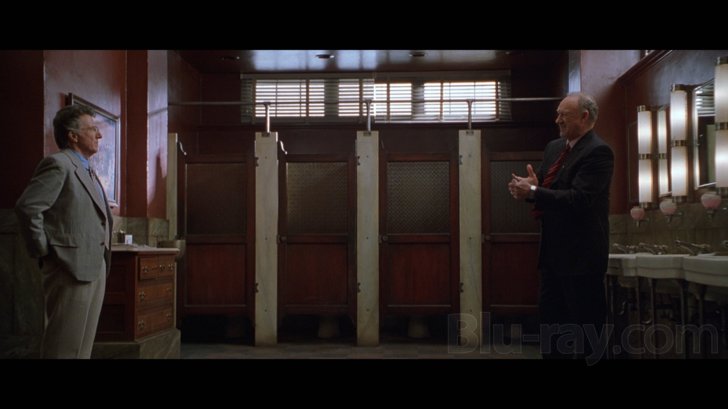
Lawyers making closing arguments usually try to flatter jurors by talking about the jury's crucial role in administering justice and the historical importance of trial by jury. But when you look at American popular culture, the institution of the jury doesn't come off so well. For every Twelve Angry Men, there's always a To Kill a Mockingbird, in which the jury clearly reaches the wrong verdict. Anatomy of Murder, which is still one of the most technically accurate portrayals of a criminal trial on film, primarily shows how the facts disappear under the spin and manipulation of the lawyers for both sides, and in the end it's very much in doubt whether the right result has been achieved. The Verdict is a magnificent morality play, but it's so riddled with errors (many of them deliberate) that it begs for a sequel called The Reversal. And let's not forget Perry Mason, who, despite being the greatest defense lawyer ever to try a fictional case, had so little faith in juries that he never let them deliberate; instead, he always got the real murderer to confess on the stand. (Cousin Vinny did much the same thing by getting the state to drop the charges.) So the cynicism about juries reflected in Grisham's novel and the screenplay adaptation for Runaway Jury is nothing new. Grisham and the screenwriters simply expanded the number of players trying to push the jurors' buttons and move them one way or the other—by any means necessary. The result may not be literally true to life, but it's an apt metaphor for the cacophony of voices vying to influence each of us in important decisions (how to vote, what to think, where to spend our money). And it makes for an interesting battle of dramatic personalities and an entertaining film. Highly recommended.
Similar titles
Similar titles you might also like

High Crimes
2002

The Client
1994

The Rainmaker
1997

The Life of David Gale
2003

Haven
2004

Rushlights
2012

The Juror
1996

Nuts
1987

Double Jeopardy 4K
1999

The Paradine Case
1947

Absence of Malice
1981

A Perfect Murder
1998

Midnight in the Garden of Good and Evil
Warner Archive Collection
1997

North Country
2005

Woman in Gold
2015

Conspiracy Theory
1997

Stage Fright
Warner Archive Collection
1950

Disclosure
1994

Pinky
1949

Derailed
2005